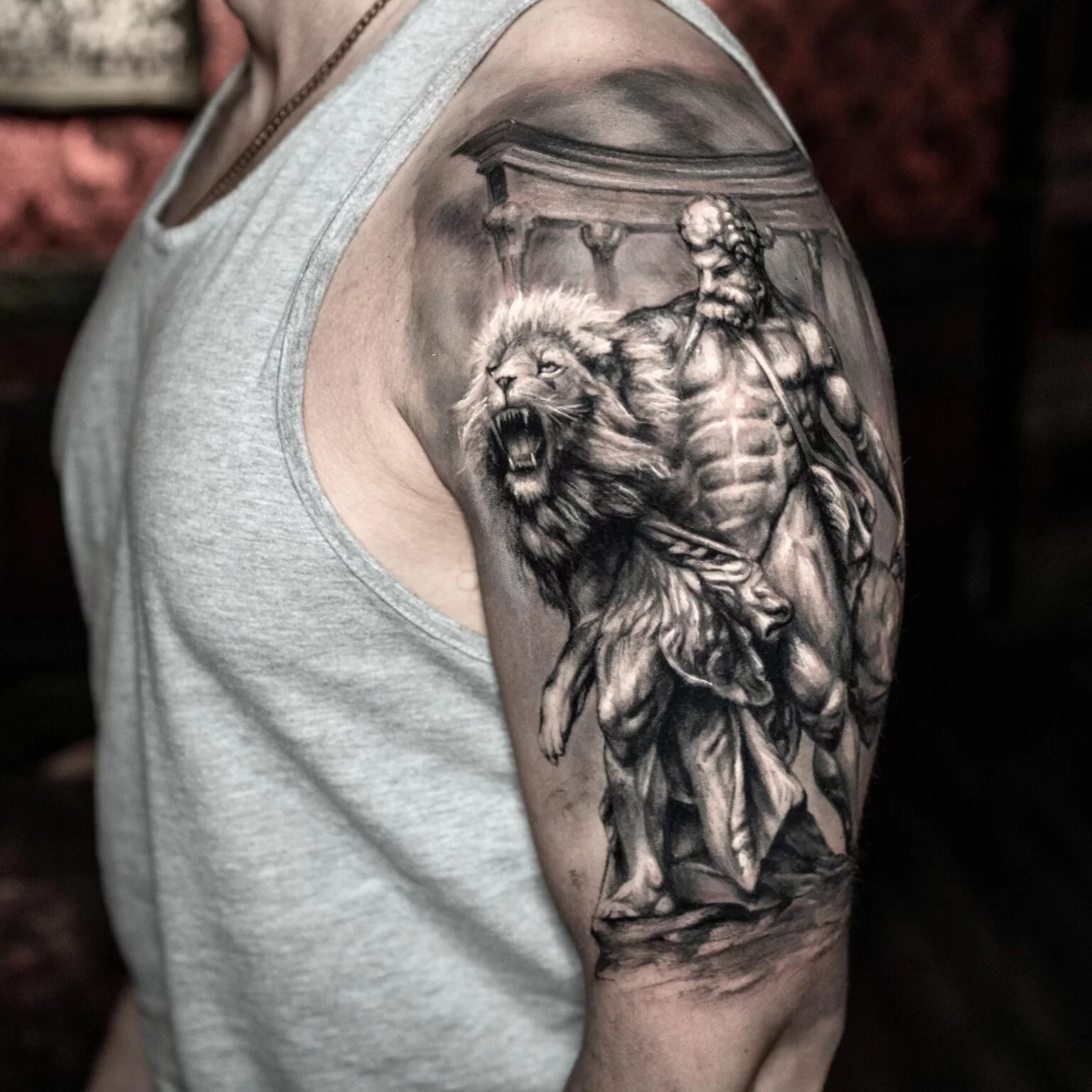Greek mythology, with its rich tapestry of gods, heroes, and mythical creatures, has long captivated the human imagination. This fascination extends beyond literature and art, influencing modern body art, including tattoos. Greek mythology tattoos blend ancient symbolism with contemporary aesthetics, offering a powerful way to connect with mythological themes. This comprehensive article explores the significance, history, and artistic expression of Greek mythology tattoos, providing insights into how these designs resonate with personal and cultural narratives.
The Allure of Greek Mythology
Greek mythology is a profound source of stories and symbols that have inspired countless works of art, literature, and design throughout history. The myths and legends of ancient Greece are not just tales of gods and heroes; they embody timeless themes of love, power, fate, and transformation.
- Rich SymbolismGreek mythology is filled with symbols that carry deep meanings. Gods like Zeus, Athena, and Poseidon, along with mythical creatures like the Phoenix and the Minotaur, each represent different aspects of human experience and nature. These symbols are often chosen for tattoos due to their rich historical and personal significance.
- Timeless ThemesThe themes of Greek mythology, such as heroism, transformation, and divine intervention, are universal and timeless. These themes resonate with many people on a personal level, making Greek mythology tattoos a meaningful choice for those who identify with these narratives.
Historical Context of Greek Mythology Tattoos
The practice of tattooing in ancient Greece is not well-documented, but there is evidence suggesting that tattoos were used for various purposes, including marking prisoners and slaves. The modern resurgence of Greek mythology tattoos is part of a broader trend of integrating classical themes into contemporary body art.
- Ancient Tattoo PracticesHistorical accounts and archaeological findings suggest that tattoos were used in ancient Greece for marking purposes rather than artistic expression. However, the rich iconography of Greek mythology would later inspire artistic expressions in tattoos.
- Revival in Modern Tattoo CultureIn recent decades, Greek mythology tattoos have gained popularity, driven by a renewed interest in ancient cultures and their symbolism. Modern tattoo artists often draw on classical mythology to create intricate and visually striking designs that reflect both personal meaning and aesthetic appreciation.
Popular Greek Mythology Tattoo Designs
Greek mythology tattoos encompass a wide range of designs, each reflecting different aspects of the myths and their characters. Here are some of the most popular and meaningful designs:
- Gods and Goddesses
- Zeus: The king of the gods is often depicted with symbols like the thunderbolt, eagle, or his regal visage. Zeus tattoos represent power, authority, and justice.
- Athena: The goddess of wisdom and warfare is usually represented with an owl, her armor, or the olive tree. Tattoos of Athena symbolize wisdom, courage, and strategic thinking.
- Poseidon: The god of the sea is commonly associated with the trident and sea creatures. Poseidon tattoos evoke themes of strength, control, and the power of the natural world.
- Heroes and Legends
- Hercules: Known for his incredible strength and heroic deeds, Hercules is often depicted with symbols of his twelve labors or his iconic club. Tattoos of Hercules symbolize bravery, perseverance, and strength.
- Persephone: The queen of the underworld and goddess of spring is represented with pomegranates or flowers. Persephone tattoos reflect themes of transformation, rebirth, and duality.
- Mythical Creatures
- Phoenix: The mythical bird that rises from its ashes represents renewal and immortality. Phoenix tattoos are popular for their vibrant colors and symbolic meaning of rebirth and resilience.
- Medusa: With her serpentine hair and petrifying gaze, Medusa symbolizes danger, power, and the transformative effects of anger and betrayal. Medusa tattoos often feature intricate details and are popular for their dramatic impact.
- Symbolic Elements
- Labyrinth: The labyrinth, associated with the Minotaur myth, symbolizes complexity and the journey through difficult challenges. Labyrinth tattoos can represent personal struggles and the quest for self-discovery.
- Golden Fleece: The symbol of Jason and the Argonauts’ quest represents the pursuit of glory and achievement. Tattoos featuring the Golden Fleece convey themes of ambition and adventure.
Choosing the Right Greek Mythology Tattoo
Selecting a Greek mythology tattoo involves personal reflection and consideration of the design’s meaning and aesthetic appeal. Here are some factors to consider:
- Personal Significance
- Resonance with Mythology: Choose a design that resonates with your personal beliefs, experiences, or aspirations. The mythological figures or symbols should reflect something meaningful to you.
- Artistic Style
- Realistic vs. Abstract: Decide whether you want a realistic depiction of mythological figures or a more abstract interpretation. Each style can convey different aspects of the mythology and impact the overall look of the tattoo.
- Size and Placement
- Location on the Body: Consider where you want the tattoo placed and how the design will fit with other tattoos or body features. The placement can affect the visibility and impact of the tattoo.
- Size: Choose a size that matches your preferences and the complexity of the design. Larger tattoos allow for more intricate details, while smaller ones offer a more subtle representation.
The Artistic Process
Creating a Greek mythology tattoo involves a collaborative process between the client and the tattoo artist. Here’s an overview of what to expect:
- Consultation
- Design Discussion: Discuss your ideas and preferences with the tattoo artist. Provide references or descriptions of the Greek mythology elements you want to include.
- Sketching and Refinement: The artist will create a preliminary sketch based on your input. You can review and request adjustments to ensure the design aligns with your vision.
- Tattooing
- Preparation: The artist will prepare the tattoo area and ensure it is clean and sanitized. They will also set up their equipment for the tattooing process.
- Tattoo Application: The artist will apply the tattoo using a combination of needles and ink. This process can take several hours depending on the size and complexity of the design.
- Aftercare
- Healing Instructions: Follow the artist’s aftercare instructions to ensure proper healing. This typically includes keeping the tattoo clean, avoiding direct sunlight, and applying ointments as needed.
- Maintenance: Proper care will help maintain the tattoo’s appearance over time. Regular touch-ups may be necessary to preserve the design’s vibrancy.
Cultural and Ethical Considerations
Greek mythology tattoos, like all tattoos, should be approached with cultural sensitivity and respect. Here are some considerations:
- Cultural Respect
- Understanding the Mythology: Take the time to learn about the myths and symbols you’re considering. Understanding their cultural and historical context can deepen your appreciation and ensure respectful representation.
- Ethical Tattooing
- Choosing a Reputable Artist: Select a professional tattoo artist with experience and a good reputation. Ensure they adhere to ethical practices and maintain high hygiene standards.
Trends and Innovations
As tattoo artistry continues to evolve, new trends and innovations emerge, influencing how Greek mythology is represented in body art.
- New Techniques
- 3D Tattoos: Advances in tattooing techniques allow for more dynamic and three-dimensional designs. Greek mythology tattoos can take on a new dimension with these innovative methods.
- Watercolor Styles: The watercolor tattoo style, with its vibrant and fluid colors, can bring mythological designs to life in unique and visually striking ways.
- Cultural Fusion
- Blending Mythologies: Some modern tattoos blend Greek mythology with elements from other cultures or mythologies, creating hybrid designs that reflect a broader range of influences.
- Contemporary Interpretations: Artists are continually exploring new ways to reinterpret classical myths in contemporary styles, making Greek mythology tattoos increasingly diverse and imaginative.
Conclusion
Greek mythology tattoos offer a rich and meaningful way to connect with the ancient stories and symbols that have captivated humanity for centuries. Whether through depictions of gods and goddesses, heroes and mythical creatures, or symbolic elements, these tattoos provide a powerful means of personal expression and artistic exploration. By understanding the historical context, choosing designs that resonate personally, and working with skilled artists, individuals can create tattoos that not only honor the mythology but also reflect their own unique journeys and aspirations. As trends and techniques evolve, the art of Greek mythology tattoos continues to inspire and captivate, blending timeless myths with modern artistry.



